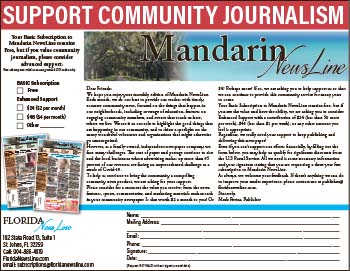By Master Gardener Volunteer Lesley Arrandale
mail@floridanewsline.com
Having suffered from temperatures in the mid- to upper-nineties with very little rain, at the end of May I checked the 30-day forecast from NOAA to see what might be heading our way (https://tinyurl.com/yxnrqevg). Apparently temperatures were to be higher than usual in June, and precipitation could either be average or more or less than usual. As always, rainfall predictions seem to be the least reliable.
However, as of June 7, we are expecting a stormy week, so perhaps our gardens will be happy, and the Topsoil Moisture Monitor, which had recently reported that all southeastern states were measurably “very dry,” may soon be relaying better news (https://tinyurl.com/y5hovzkm).
I recently discovered a newly molted cicada, probably a southern dusky winged or southern swamp cicada, Neotibicen tibicen, hanging from a fresh coontie (Zamia pumila) frond right by my front path. It was just unfurling its beautiful pale blue-green wings, like a new butterfly. Having only ever seen exoskeletons of cicadas before, this was quite surprising.
The cicada was easy to spot, as I had recently removed all the coontie’s mature fronds because they were infested with scale insects and mealy bugs. The coontie is at least 20 years old, with a massively expanded root system, and had no trouble flushing out with fresh growth almost immediately, despite the droughty weather. To — hopefully — avoid a further infestation, I drenched the soil around the plant with an organic insecticide containing fish oil and sesame oil, which should have smothered the scale. (Luckily the cicada wasn’t affected; it was either too deep underground for the insecticidal oil to reach, or it was protected by its sturdy exoskeleton.) At the first signs of more scale insects I will spray the plant again; sometimes several applications of an oil product are needed, at intervals of a week or two. I had initially delayed treating the plant because of the predatory, beneficial insects buzzing around it, but they couldn’t keep the scale in check.
My street is changing its character as the years go by, as is much of our city. We moved here partly because of the old, majestic oaks and hickories that shaded the road and sheltered us from the sun. There are still some of those trees left, but many have gone, felled by storms, disease, and old age. A young red maple (Acer rubrum) in a neighbor’s yard recently turned brown very rapidly, and was cut down this week. The weather has been so dry and we are located on a sand hill with quick-draining soil, so I assume it was a problem of irrigation, since maples grow best in damp locations. In the heat the tree simply transpired rapidly and couldn’t take up enough moisture from the dry soil to compensate. Choosing trees for our landscapes is akin to choosing any other plant — we must put the Right Tree (Plant) in the Right Place. Realistically it’s even more important: a 15-year old tree is considerably harder and more expensive to replace than a 15-month-old perennial, or a 15-week-old annual.
Summer is an ideal time to sit down with some reference books, catalogs, and reliable internet resources, and start planning your fall activities. If that includes planting a tree, the University of Florida has detailed information to help you choose wisely. This site lists the sort of questions you should consider before deciding on which tree: https://tinyurl.com/y6k5vovk. It looks complicated, but narrowing down the options to ensure your tree will thrive in its allotted place is invaluable.
In July there will be a new edition of the ever-useful Extension service newsletter, A New Leaf. You’ll find it here: https://tinyurl.com/y9yfxd89, so check it out. There is a new agent at Extension, replacing Terry DelValle who retired recently. He is Dr. Chris Kerr, the Duval County Urban Horticulture Extension Agent and Master Gardener Coordinator, and all Master Gardener Volunteers, I’m sure, wish him well and look forward to collaborating with him. Welcome to Jacksonville!








